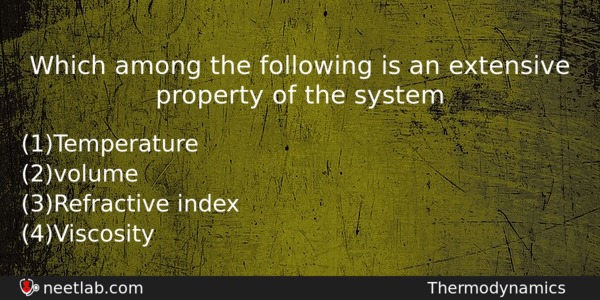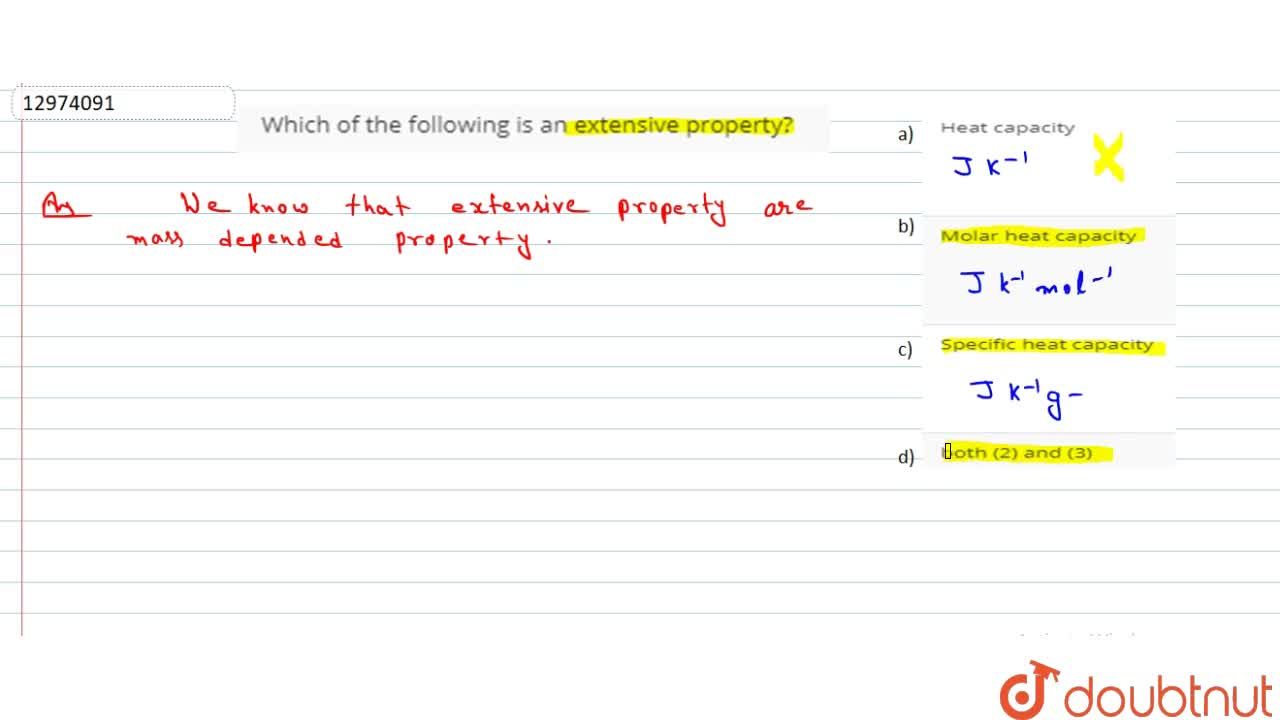Which of the Following Is an Extensive Property
Explain whether the following properties are extensive or inten. The extensive properties change as the amount of matter or sample changes.

Solved 1 Which Of The Following Is An Extensive Property Chegg Com
Examples are mass volume length and total charge.

. Please scroll down to see the correct answer and solution guide. Heat capacity is the correct answer and it is an extensive property. Chemistry questions and answers.
Specific volume specific entropy etc. Mass Internal Energy Enthalpy Volume Entropy etc. The extensive properties of a system __.
For eg Internal Energy Enthalpy Volume Entropy. All specific properties are intensive properties. Understand What an Extensive Property Is in Chemistry.
H₂O g H₂O l This represents the process of condensation which is a physical change not a chemical change. Intensive properties are the properties which depend only upon the nature of the substance and are independent of the amount of the substance present in the system eg heat boiling point emf of a cell etc. Intensive properties are things like boiling point odor hardness melting point temperature etc.
Which of the following is an extensive property of syst Which of the following is an extensive property of system. TEK IMAGE Getty Images. Are dependent upon the mass of the system and are called extensive properties.
Volume energy and mass are examples of extensive properties. An intensive property doesnt change when you take away some of the sample. In four stroke cycle engine cycle is co.
Lancashire boilers are _____ Smoke tube boilers have large water to s. Heat capacity for the mass of the system is an extensive property but the specific heat for the unit mass of the system is intensive property. A boiling point O b density O c temperature O d mass e average kinetic energy of molecules Save Question 18 1 point A flask has a mass of 7823 g when empty and 59363 g when filled with water.
The properties which depend on the mass of the system under consideration. Volume energy and mass are examples of extensive properties. A property of a system whose magnitude depends upon the amount of matter is known as extensive property.
Which one of the following is an example of an extensive property. An isobaric process has constant _____ Which of the following energy conversion. Volume is an example of an extensive property which is a type of physical property that depends on sample size or mass.
Extensive properties depent upon the amount of the substance. Jd3sp4o0y and 71 more users found this answer helpful. Complete step by step answer.
All specific properties are intensive properties. Examples are temperature color hardness melting point boiling point pressure molecular weight and density. Which one of the following is an example of a pure.
An extensive property of a system depends on the system size or the amount of matter in the system. The property of matter that does not depend on the amount of matter is known as an intensive property. Asked Sep 29 2021 in Chemistry by MukulJain 668k points class-11.
Question 17 1 point Which of the following is an extensive property of oxygen. Mass volume and pressure are extensive properties. These are the properties of the system which are independent of mass under consideration.
The volume changes as the amount of matter changes. Explain whether the following properties are extensive or inte. Chemistry questions and answers.
No chemical bonds have been broken or made in the process. An extensive property is one that depends on the amount of substance present not on the identity of the substance. Extensive Properties are things like Volume mass weight and length.
Extensive properties depends on the quantity of matter but intensive properties do not. An extensive property is a property that changes when the size of the sample changes. Which of the following is a chemical property.
The properties which depend on the mass of the system under consideration. Extensive properties are the properties which depend upon the quantity of the matter contained in the system eg mass volume Gibbs free energy etc. Temperature specific heat mass pressure O density Select the answer with the correct number of decimal places for the following sum.
We also remember that an extensive property may become intensive property by specifying the unit of the amount substance concerned. The amount of space occupied by any matter or object or substance is known as volume. Which type of bearings are known as anti.
Examples of extensive properties include. Which of the following statements are fa. Extensive properties do depend on the amount of matter that is present.
13914 cm 2431 cm 1200460 cm 2690 cmm 26901860cm 26902 cm 269019 cm 2690186 cm Given that 1 in 254 cm 1 cm3 is. Thus Density is not an extensive property. An extensive property is considered additive for subsystems.
When the same flask is filled with concentrated sulfuric acid. Properties like mass volume internal energy heat content free energy enthalpy entropy heat capacity surface area energy etc. If the value of the property of a system is equal to the sum of the values for the parts of the system then such a property is called extensive property.
Intensive properties The properties of the system whose value for the. For example total volume total mass and total energy of a system are extensive properties. Which of the following is an extensive property.
It would be D. Extensive properties The properties of the system whose value for the entire system is equal to the sum of their values for the individual parts of the system are called extensive properties. The ratio between two extensive properties is an intensive property.

Which Among The Following Is An Extensive Property Of The System Neetlab


No comments for "Which of the Following Is an Extensive Property"
Post a Comment